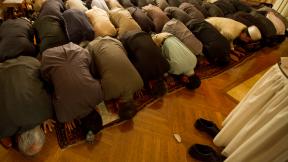
“O ye who believe! Eat of the good things that We have provided for you, and be grateful to Allah, if it is Him ye worship” (Quran 2:178)
Although everyone makes an intention to fast during the month of Ramadan, those who suffer from long-term health issues are not obligated to fast. Muslims diagnosed with cancer, cardiovascular diseases, diabetes, chronic kidney disease, peptic ulcers, irritable bowel syndrome, and other serious diseases may find their condition worsened by fasting. bIslam makes provisions for the totality of the human experience, so Muslims in this situation have alternatives, like giving Sadaqa (charity) or feeding the less fortunate.
However, even healthy Muslims may find themselves experiencing some health-related issues in Ramadan brought on by the fast itself.
Gastro-Intestinal
- The stomach is designed to digest food and kill bacteria. The stomach and esophagus emit juices that help control the development of acid. If too much acid is in the stomach or if the esophagus itself becomes aggravated, heartburn can develop. Typically, fasting will reduce the amount of acid in the stomach, but breaking the fast with greasy foods, foods with capsicum, spicy, oily, fried foods, or even nuts which can be difficult to digest, can cause the stomach to produce acid.
- Other gastro-intestinal complications include upset stomach or even loose bowels. After fasting all day the stomach is sensitive to what enters it and there is not enough liquid in the GI tract to wash away any excess or even bacteria that may have accumulated.
- The best way to reduce heartburn, indigestion, upset stomach or diarrhea is to break the fast slowly. Break the fast and then perform the Salatul Maghrib, giving the stomach a moment of rest. If heartburn or other GI problems persist, take medication for indigestion like antacids or proton pump inhibitors. For stomach distress or diarrhea, take magnesium, carbonates, or anti-diarrheal medications after eating. Also, tea, peppermint, ginger or fresh lemon in water is effective. These may be taken after breaking the fast, and even in the morning before beginning the fast to settle the stomach.
- Some people fasting may also experience constipation. Constipation occurs when not enough liquid and fiber like fruits, vegetables, and cereals are consumed. Constipation can be particularly stressful, but including a high fiber diet will help. It is part of the tradition of Prophet Muhammad, peace and blessings be upon him, to break fast by consuming three dates. Dates themselves are a wonderful source of fiber and help with digestion. In addition, other dried fruits like figs, prunes, apricots and raisins are also helpful. Prunes are high in fiber and contain sorbitol, which is a natural laxative. Grapes are a source of insoluble fiber, which can help regulate your bowel movements. If the situation persists, a stool softener and increase of fluid at Suhoor (the pre-dawn meal) or Iftar (the fast-breaking meal) is recommended.
Headache
- In the first few days of Ramadan, many Muslims may experience the “Ramadan headache”. This may be the result of low blood sugar, dehydration, sleep deprivation or even caffeine withdrawal. Headaches begin in the nerves, muscles and blood vessels around the head, face, and neck. The nerves are aggravated by stress, muscle tension, enlarged blood vessels and many other factors. Although many neuroscientists confirm that fasting clears the mind, awakens the senses, and improves brain function, a fasting headache relates to stimulation of the nerves.
- The key to treating headaches is to be proactive instead of just being reactive. For example, it is important to consume food before dawn at Suhoor. Foods that are high in carbohydrates provide the body with glucose, which is converted to energy used to support bodily functions and physical activity. The brain uses glucose as an essential source of energy. Therefore, when it does not receive enough glucose from carbohydrates, the blood vessels start to tighten and raise blood pressure, which causes tension and pain in the head.
- In addition, overexertion, excessive direct sunlight, heat or cold may also make one susceptible to developing a headache. Caffeine withdrawal from the reduction in teas, coffee and other drinks is also a challenge. In the early days of fasting, our bodies are hypersensitive, just like our state of Iman (faith) and Ibadah (worship).
- When the headache develops, a darkened, cool room or a short gentle massage can help relieve the tense muscles and calm the nerves. Those who experience frequent or disabling migraines must ensure that their condition is under control before beginning the fast so that they do not put their health in jeopardy. After breaking the fast, mild pain relievers may be used since managing pain is a preventative measure. For most people who are fasting, after the first few days, the incidence of headache decreases as their bodies adjust to the fast. However, a persistent or disabling headache requires medical attention.
Dehydration
- The reduction of liquids during the day makes dehydration a common occurrence for many people who fast. Even while fasting, our bodies will lose water and salts through the natural processes of sweat, urine and even breathing. Other factors that contribute to the loss of water in the body include the weather conditions and physical exertion. Muslims who are elderly or taking certain medicines that include diuretics are also at risk of experiencing dehydration. Due to the decrease in water intake during the daytime, it is important to hydrate before and after the fast.
- A dehydrated person will likely experience an overall sense of feeling unwell. This will include feeling tired, having muscle cramps or dizziness. Severe dehydration is manifested with disorientation and even fainting. While fasting, if feelings of disorientation begin, then the need to hydrate is urgent. The intake of fluids with sugar and salt is the ideal remedy to help set the body’s electrolytes back in place. Fainting due to dehydration is treated by raising the legs above the head and when consciousness is regained rehydrated with electrolyte fluids and then receiving medical care.








Comments
Ramadan Health Challenges
It's important to acknowledge the diverse experiences during Ramadan, especially regarding health considerations. While fasting is a spiritual practice for many, it's crucial to recognize that individuals facing long-term health issues may not be obligated to fast. The flexibility within Islam to accommodate such circumstances underscores its holistic approach to human well-being.
Moreover, even for those without chronic conditions, navigating health challenges during fasting can be a reality. Issues like gastrointestinal discomfort, headaches, and dehydration are common hurdles. Taking proactive steps such as gradual fasting and mindful food choices at Suhoor and Iftar can significantly alleviate these concerns.
From incorporating high-fiber foods to managing hydration levels, prioritizing self-care is paramount. It's a reminder of the importance of balance and moderation in practicing religious observances while safeguarding one's health. This inclusive approach ensures that everyone can participate Quran Explorer in Ramadan in a manner that respects their individual circumstances.
Location
Ramadan
One of the best way to keep good health: Don't drink water after iftar without taking some food. IF we drink water directly then we feel very sick.
Online Quran Classes
Location
Add new comment